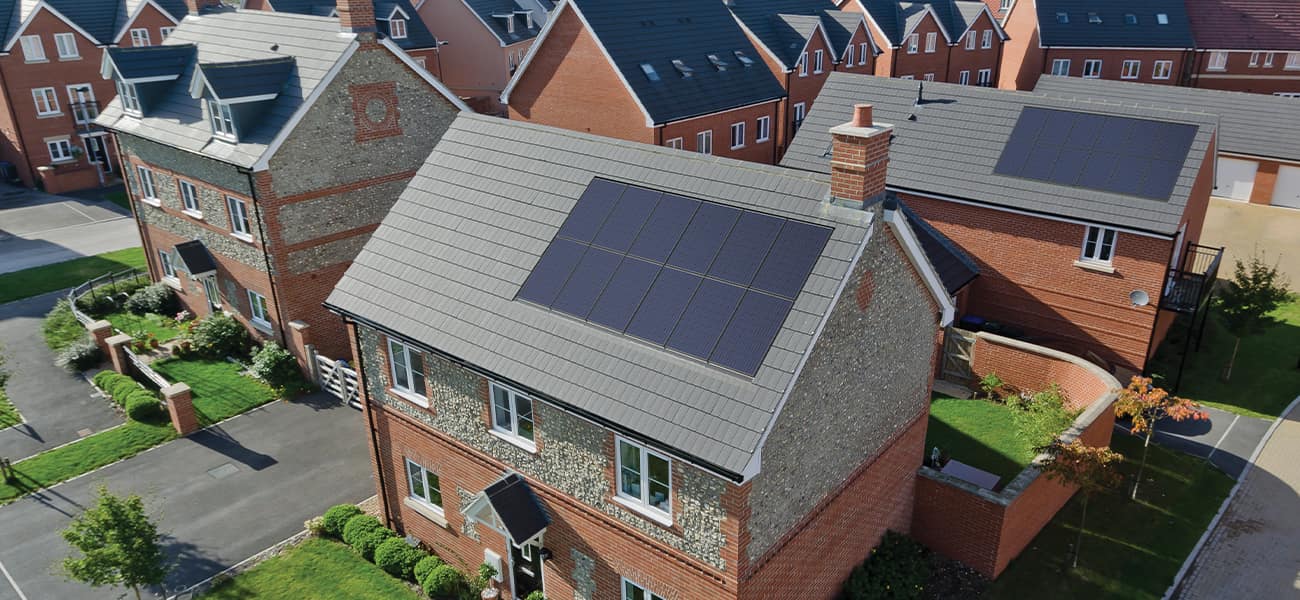Solar panel specification considerations for residential dwellings

From fire safety and electrical capacity to appearance and roof orientation, there’s a lot to think about during solar panel specification for residential properties.
In the UK, all new homes are required to have energy-saving measures that achieve a 31% reduction in carbon emissions. Solar panels can play a big part in ensuring compliance with this regulation.
Today’s homebuyers are also looking for homes with solar installations, as the benefits of these systems include reduced energy costs as well as a lower carbon footprint. So, what do you need to think about as part of a solar panel specification? Let’s look at some of the main considerations.
Solar panel specification: safety first
Fire safety is always a top consideration when specifying any part of a building, and it’s certainly important when planning a solar panel installation on a residential dwelling.
Solar panels are generally very fire safe. All solar panels must have a UKCA mark to be sold in the UK, meaning that they conform to the relevant quality and safety standards. This means that there is actually minimal risk associated with the solar panels themselves. Instead, the risk is mainly with the electrical installation and the DC connectors, which can create electrical arcs if not properly installed.
To ensure solar installations are safe, be sure that a qualified electrician makes all the electrical connections. Other ways that specifiers can mitigate fire risk include:
- Opting for in-line solar systems such as Marley SolarTile
- Using fire-safety products like ArcBox
- Ensuring DC connections comprise components from the same manufacturer
- Installing fire-resistant roofing materials
- Educating homeowners and occupants about the solar installation
Specifying solar panels with adequate capacity
The capacity of the solar system is another important consideration. While specifiers can’t be sure what the energy use of a new household might be, the overall size of the home, the number of bedrooms and the location can all help you estimate a suitable capacity.
Adding solar batteries can also help with solar panel specification. Batteries enable unused solar-generated electricity to be stored for use later. This is particularly useful for households where the occupants primarily work during the day. Since solar panels generate electricity all day, the batteries will provide free electricity in the evenings when the residents are home.
Other solar panel specification considerations
As well as fire safety and electrical capacity, there are a number of other things to consider as part of solar panel specification. These include:
- Appearance – While solar panels were once considered environmentally friendly eyesores, many modern arrays are designed to boost a home’s appearance.
- Roof-integrated vs on-roof – Solar panels come in two main types. On-roof solar panels are bolted onto the roof, above the roofline. This is generally considered less aesthetically pleasing and it also leaves a gap where debris can build up, or which can serve as a shelter for unwanted pests. Roof-integrated solar panels, such as the Marley SolarTile, take the place of roof tiles and sit within the roof plane. This provides a more attractive and streamlined appearance.
- Roof pitch and orientation – Solar panels don’t have to be installed at a specific pitch or pointing in a certain direction to provide adequate electricity generation. However, south-facing roofs with a lower pitch will provide maximum efficiency.
Solar panel specification with Marley
As experts in roofing, Marley offers a complete roofing system that includes everything from the battens and roof tiles to the solar panels and associated equipment. Our products make it easy to specify a safe and attractive roof with solar electricity generation while ensuring complete compatibility.
For help with roof or solar panel specification, take a look at all of our specification tools, or get in touch with a member of our knowledgeable team.
Category: Environmental Solar